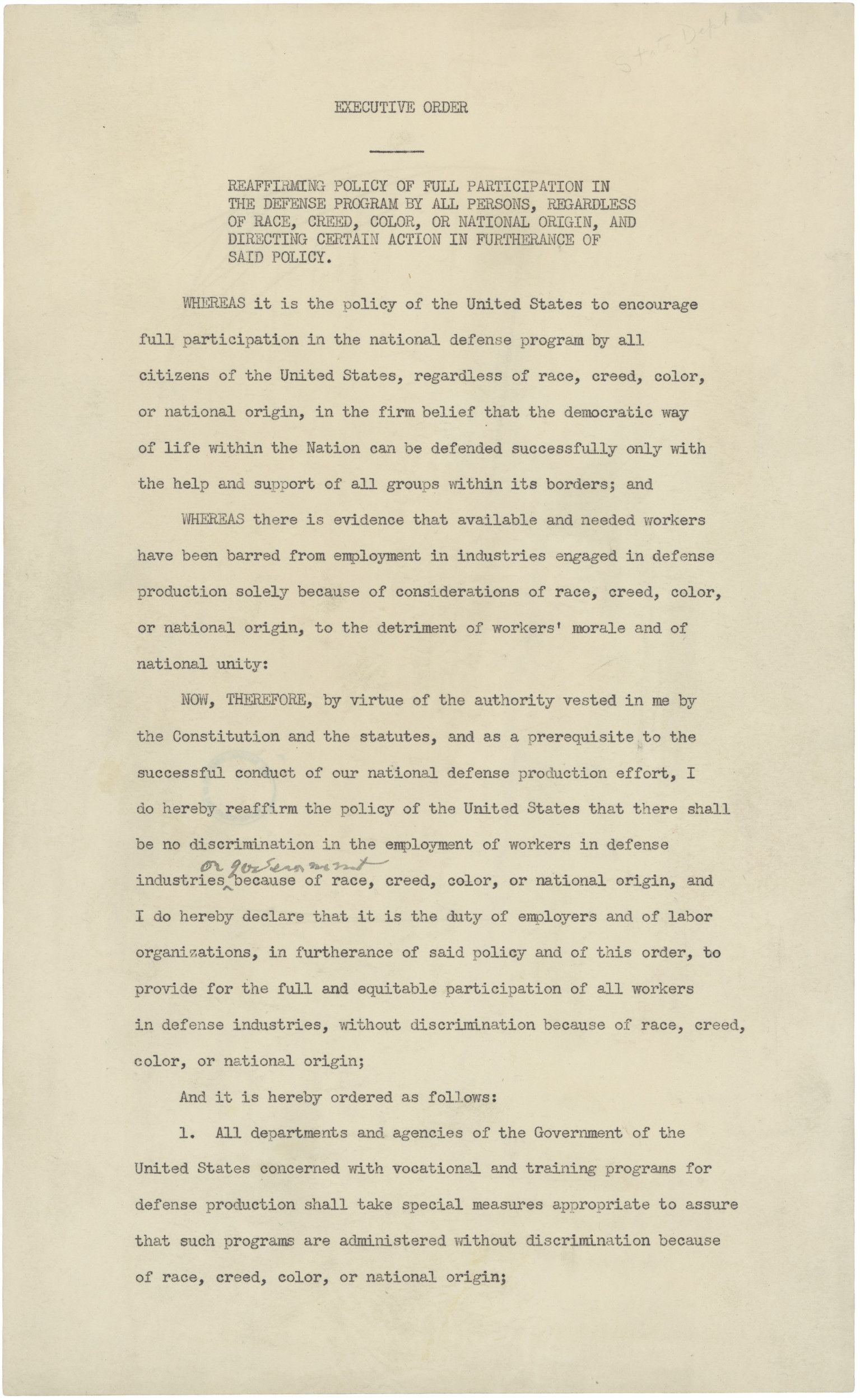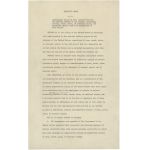Executive Order 8802 to Prohibit Discrimination in the Defense Industry
6/25/1941
Add to Favorites:
Add all page(s) of this document to activity:

Add only page 1 to activity:
Add only page 2 to activity:
President Franklin D. Roosevelt issued Executive Order 8802 that banned discriminatory employment practices by federal agencies and all unions and companies engaged in war-related work.
In early 1941, millions of jobs were being created, primarily in urban areas, as the United States prepared for World War II. When large numbers of African Americans moved to cities in the north and west to work in defense industries, starting the "Second Great Migration," they were often met with violence and discrimination.
In response, A. Philip Randolph, president of the Brotherhood of Sleeping Car Porters, and other Black leaders, met with Eleanor Roosevelt and members of the President’s cabinet. Randolph presented a list of grievances regarding the civil rights of African-Americans, demanding that an executive order be issued to stop job discrimination in the defense industry. Randolph, with others, threatened that they were prepared to bring "ten, twenty, fifty thousand Negroes on the White House lawn" if their demands were not met.
In reaction to the fear of tens of thousands—if not more—African Americans marching on the nation’s capitol, and after consultation with his advisers, Roosevelt responded to the Black leaders and issued Executive Order 8802 on June 25, 1941.
It declared, "There shall be no discrimination in the employment of workers in defense industries and in Government, because of race, creed, color, or national origin." It was the first presidential directive on race since Reconstruction. In exchange for Executive Order 8802, Randolph called off the march, though he would be a driving force of the 1963 March on Washington.
To investigate “complaints of discrimination in violation of the provisions of this order” Executive Order 8802 established the “Committee on Fair Employment Practice.” More commonly known as the Fair Employment Practice Committee (FEPC), it has been disregarded by most historians as a powerless and ineffectual agency, especially in the South.
After World War II, the FEPC almost became a permanent agency, but a strong voting bloc in Congress prevented it. Shortly after the dismantling of the FEPC, President Truman issued Executive Order 9981 banning segregation in the military.
In early 1941, millions of jobs were being created, primarily in urban areas, as the United States prepared for World War II. When large numbers of African Americans moved to cities in the north and west to work in defense industries, starting the "Second Great Migration," they were often met with violence and discrimination.
In response, A. Philip Randolph, president of the Brotherhood of Sleeping Car Porters, and other Black leaders, met with Eleanor Roosevelt and members of the President’s cabinet. Randolph presented a list of grievances regarding the civil rights of African-Americans, demanding that an executive order be issued to stop job discrimination in the defense industry. Randolph, with others, threatened that they were prepared to bring "ten, twenty, fifty thousand Negroes on the White House lawn" if their demands were not met.
In reaction to the fear of tens of thousands—if not more—African Americans marching on the nation’s capitol, and after consultation with his advisers, Roosevelt responded to the Black leaders and issued Executive Order 8802 on June 25, 1941.
It declared, "There shall be no discrimination in the employment of workers in defense industries and in Government, because of race, creed, color, or national origin." It was the first presidential directive on race since Reconstruction. In exchange for Executive Order 8802, Randolph called off the march, though he would be a driving force of the 1963 March on Washington.
To investigate “complaints of discrimination in violation of the provisions of this order” Executive Order 8802 established the “Committee on Fair Employment Practice.” More commonly known as the Fair Employment Practice Committee (FEPC), it has been disregarded by most historians as a powerless and ineffectual agency, especially in the South.
After World War II, the FEPC almost became a permanent agency, but a strong voting bloc in Congress prevented it. Shortly after the dismantling of the FEPC, President Truman issued Executive Order 9981 banning segregation in the military.
Transcript
Executive OrderReaffirming Policy Of Full Participation In The Defense Program By All Persons, Regardless Of Race, Creed, Color, Or National Origin, And Directing Certain Action In Furtherance Of Said Policy
June 25, 1941
WHEREAS it is the policy of the United States to encourage full participation in the national defense program by all citizens of the United States, regardless of race, creed, color, or national origin, in the firm belief that the democratic way of life within the Nation can be defended successfully only with the help and support of all groups within its borders; and
WHEREAS there is evidence that available and needed workers have been barred from employment in industries engaged in defense production solely because of considerations of race, creed, color, or national origin, to the detriment of workers' morale and of national unity:
NOW, THEREFORE, by virtue of the authority vested in me by the Constitution and the statutes, and as a prerequisite to the successful conduct of our national defense production effort, I do hereby reaffirm the policy of the United States that there shall be no discrimination in the employment of workers in defense industries or government because of race, creed, color, or national origin, and I do hereby declare that it is the duty of employers and of labor organizations, in furtherance of said policy and of this order, to provide for the full and equitable participation of all workers in defense industries, without discrimination because of race, creed, color, or national origin;
And it is hereby ordered as follows:
1. All departments and agencies of the Government of the United States concerned with vocational and training programs for defense production shall take special measures appropriate to assure that such programs are administered without discrimination because of race, creed, color, or national origin;
2. All contracting agencies of the Government of the United States shall include in all defense contracts hereafter negotiated by them a provision obligating the contractor not to discriminate against any worker because of race, creed, color, or national origin;
3. There is established in the Office of Production Management a Committee on Fair Employment Practice, which shall consist of a chairman and four other members to be appointed by the President. The Chairman and members of the Committee shall serve as such without compensation but shall be entitled to actual and necessary transportation, subsistence and other expenses incidental to performance of their duties. The Committee shall receive and investigate complaints of discrimination in violation of the provisions of this order and shall take appropriate steps to redress grievances which it finds to be valid. The Committee shall also recommend to the several departments and agencies of the Government of the United States and to the President all measures which may be deemed by it necessary or proper to effectuate the provisions of this order.
Franklin D. Roosevelt
The White House,
June 25, 1941.
This primary source comes from the General Records of the United States Government.
National Archives Identifier: 300005
Full Citation: Executive Order 8802 dated June 25, 1941, in which President Franklin D. Roosevelt prohibits discrimination in the defense program; 6/25/1941; Executive Orders, 1862 - 2011; General Records of the United States Government, Record Group 11; National Archives Building, Washington, DC. [Online Version, https://www.docsteach.org/documents/document/executive-order-8802, April 26, 2024]Activities that use this document
- Confronting Work Place Discrimination on the World War II Home Front
Created by the National Archives Education Team
Rights: Public Domain, Free of Known Copyright Restrictions. Learn more on our privacy and legal page.


